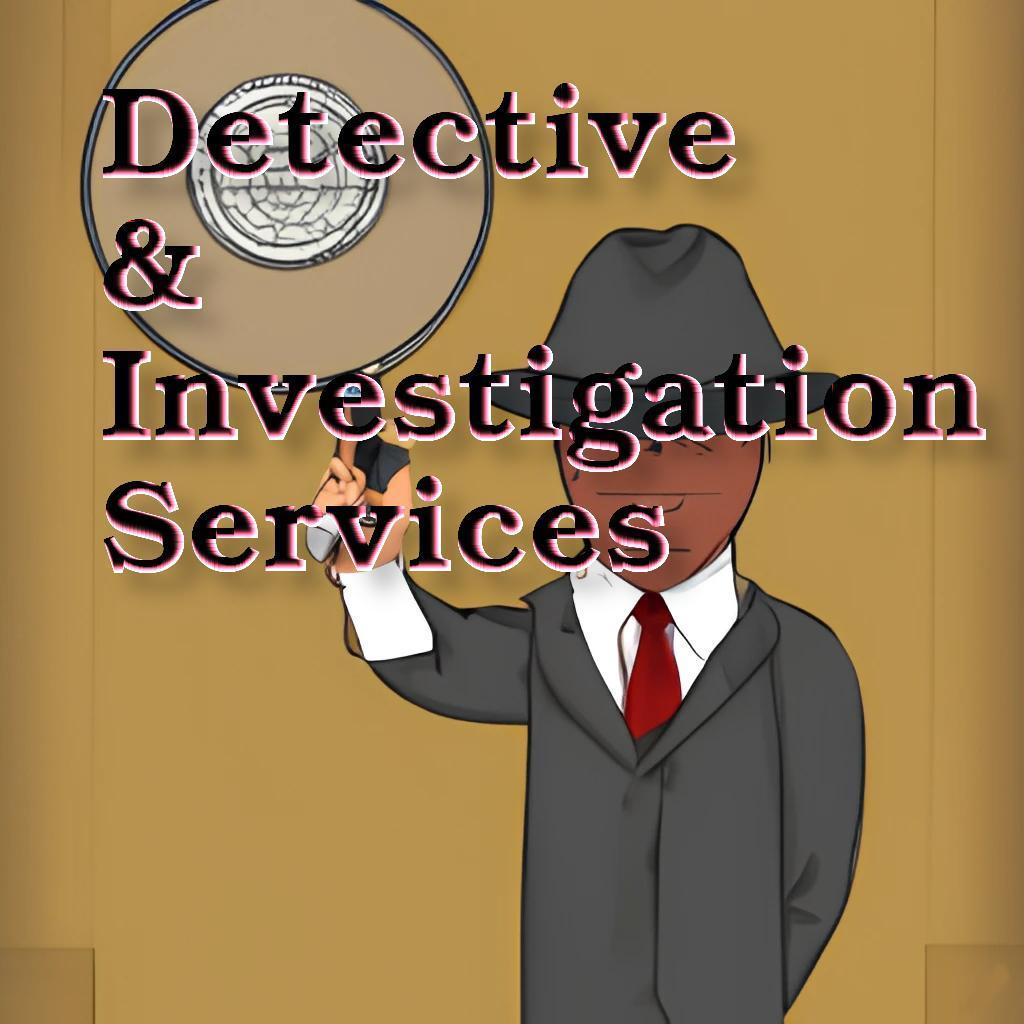








The world of detective and investigator services is one of intrigue, uncovering truths, and solving mysteries. Whether for personal matters, legal cases, or corporate concerns, the expertise of detectives and investigators can prove invaluable. In this comprehensive guide, we will delve into the realm of detective and investigator services, providing insights into their roles and offering tips for those seeking their assistance.
Understanding Detective and Investigator Services.
Types of Services:
Tip: Detectives and investigators offer a range of services, including background checks, surveillance, asset searches, and locating missing persons. Understand the specific services you require to choose the right professional.
Legal Compliance:
Tip: Ensure that the detective or investigator you engage with adheres to legal and ethical standards. Licensed professionals follow proper procedures, ensuring the information they gather is admissible in court if needed.
Specialization Matters:
Tip: Choose a detective or investigator with experience or specialization relevant to your case. Different professionals specialize in areas such as corporate investigations, family law, or criminal defense.
Confidentiality:
Tip: Maintain open communication with your investigator, and establish expectations regarding confidentiality. A trustworthy investigator understands the sensitive nature of their work and respects client privacy.
Clear Contract and Fees:
Tip: Clearly outline the terms of engagement and fees in a written contract. This document should specify the scope of work, timelines, and any potential additional costs. Understanding the terms upfront avoids misunderstandings later.
Regular Updates:
Tip: Request regular updates on the progress of the investigation. Transparent communication ensures you are informed about developments and allows for adjustments to the investigation strategy if needed.
Technology Utilization:
Tip: Inquire about the technology and tools used by the detective or investigator. Professionals who leverage advanced tools and techniques are often more efficient in gathering information and evidence.
Tips for Hiring Detective Services.
Research Credentials:
Tip: Research the credentials and reputation of detective services. Look for reviews, testimonials, and case studies to assess their track record and determine if they have successfully handled cases similar to yours.
Personal Recommendations:
Tip: Seek recommendations from trusted sources, such as friends, family, or legal professionals. Personal referrals often provide insights into the reliability and effectiveness of detective services.
Interview Multiple Candidates:
Tip: Interview multiple detectives or investigation agencies before making a decision. Discuss your case, evaluate their approach, and assess how well they understand your specific needs.
Verify Licensing:
Tip: Confirm that the detective or investigator is licensed and registered. Licensing requirements vary by jurisdiction, so check local regulations to ensure compliance.
Transparent Communication:
Tip: Choose a detective who communicates clearly and transparently. Effective communication is crucial for understanding the progress of the investigation and maintaining a trusting relationship.
Track Record in Court:
Tip: Inquire about the detective's experience with legal proceedings. A detective who has successfully presented evidence in court can be an asset if your case progresses to that stage.
Tips for Conducting Private Investigations.
Document Everything:
Tip: Keep detailed records of all communication, observations, and findings. Well-documented information serves as valuable evidence and supports the credibility of the investigation.
Maintain Objectivity:
Tip: Stay objective throughout the investigation. Avoid making assumptions or letting personal biases influence the process. Objectivity is essential for presenting accurate findings.
Adaptability:
Tip: Be adaptable and open to changing strategies based on new information. Investigations can take unexpected turns, and flexibility is crucial for staying ahead of developments.
Legal Compliance:
Tip: Adhere to all legal and ethical guidelines throughout the investigation. Unlawful methods can compromise the credibility of the findings and may lead to legal consequences.
Respect Boundaries:
Tip: Respect the boundaries of individuals involved in the investigation. Avoid any actions that may be considered harassment or invasion of privacy, as these can have legal implications.
Detective and investigator services are professional services that involve investigating, analyzing, and gathering information to help clients solve a variety of legal, financial, or personal problems.
Detectives and investigators work to gather evidence and information for their clients, typically for the purpose of providing evidence in legal proceedings or helping clients make informed decisions.
Some common types of detective and investigator services include:
Criminal Investigation: Detectives and investigators work on behalf of law enforcement agencies, private individuals, or corporations to gather evidence related to criminal activities, such as theft, fraud, and violent crimes.
Financial Investigation: Detectives and investigators can assist clients in investigating financial crimes such as embezzlement, money laundering, and securities fraud.
Corporate Investigation: Private investigators can conduct investigations on behalf of businesses to investigate fraud, misconduct, or theft by employees or competitors.
Surveillance: Detectives and investigators can conduct surveillance on individuals or businesses to gather evidence related to their activities, such as tracking a cheating spouse or monitoring employee behavior.
Background Checks: Investigators can conduct background checks on individuals or businesses to gather information related to their criminal history, financial records, or personal reputation.
Detective and investigator services are used to help clients gather information and evidence to make informed decisions or to help build a case in legal proceedings. It's important to choose a reputable and experienced investigator or detective to ensure that the information gathered is accurate and reliable.
A private detective, also known as a private investigator, is a professional who is hired by individuals or organizations to conduct investigations and gather information. Private detectives work in a variety of fields, including criminal defense, corporate investigations, insurance investigations, and personal investigations.
Private detectives may work independently or as part of a larger investigative agency. They may use a range of techniques to gather information, including surveillance, background checks, and interviews with witnesses and suspects.
Some of the tasks that a private detective may be hired to do include:
Conducting background checks on individuals or businesses;
Investigating insurance claims for fraud;
Conducting surveillance to gather evidence;
Investigating cases of missing persons;
Investigating cases of corporate fraud or misconduct;
Assisting in criminal defense cases by gathering evidence and interviewing witnesses.
Private detectives must adhere to strict ethical guidelines and follow all relevant laws and regulations in the course of their investigations. They must also protect the confidentiality of their clients and any sensitive information that they may uncover during the course of their work.
Yes, "detective" and "investigator" are often used interchangeably to refer to the same type of professional service. Both terms typically refer to professionals who are hired to investigate and gather information on behalf of clients.
However, there may be some subtle differences in the type of work that a detective or investigator performs, depending on the context in which the term is used. For example, in some jurisdictions, a "detective" may refer specifically to a law enforcement officer who investigates crimes, while an "investigator" may refer more generally to a professional who investigates a wider range of issues.
In the context of private investigation services, the terms "detective" and "investigator" are often used interchangeably, and the services provided by both professionals may be similar. Private detectives or investigators may investigate a wide range of issues, including criminal activity, fraud, corporate misconduct, and personal matters. They may use a variety of methods to gather information, including surveillance, interviews, and background checks, and may provide their clients with evidence and reports that can be used in legal or other proceedings.
While there may be some differences in how the terms "detective" and "investigator" are used in different contexts, they are generally interchangeable and refer to the same type of professional service.
Here are some things you should know when hiring a detective or investigator:
Licensing and Credentials: Ensure that the detective or investigator you are considering is licensed and has the appropriate credentials to provide the services you require. Licensing requirements vary by state and country, so be sure to check what is required in your jurisdiction.
Experience and Expertise: Look for a detective or investigator who has experience and expertise in the area of investigation that you require. For example, if you need someone to investigate a business-related matter, look for an investigator with experience in corporate investigations.
Confidentiality: Make sure that the detective or investigator you hire values confidentiality and will protect your personal and sensitive information throughout the investigation.
Communication: Choose a detective or investigator who is easy to communicate with and keeps you informed of the progress of the investigation. Clear and regular communication is important for building trust and ensuring that the investigation is proceeding in the right direction.
Cost and Billing: Understand the cost of the services and how the investigator bills for their time and expenses. Ask for a detailed estimate and contract that outlines the services to be provided and the associated costs.
Ethics and Professionalism: Look for a detective or investigator who has a reputation for operating ethically and professionally. They should adhere to ethical standards and follow all relevant laws and regulations.
References and Reviews: Ask for references and read reviews from previous clients to get a sense of the investigator's quality of work and reputation.
Hiring a detective or investigator requires careful consideration and research to ensure that you find a professional who can provide the services you require with the utmost confidentiality, professionalism, and expertise.
Here are some things you should avoid while cooperating with a detective or investigator:
Withholding Information: It is important to be completely truthful and transparent with the detective or investigator, providing them with all relevant information you have that could help the investigation. Withholding information or lying to the investigator can hinder their ability to uncover the truth and can be detrimental to the investigation.
Interfering with the Investigation: Do not attempt to interfere with the investigation or try to conduct your own investigation in parallel. Let the investigator do their job and provide them with any information or assistance they require.
Making Assumptions or Accusations: Avoid making assumptions or accusations about the subject of the investigation. Let the investigator gather evidence and draw their own conclusions based on the facts.
Contacting the Subject of the Investigation: Do not contact the subject of the investigation or attempt to gather evidence on your own. This can compromise the integrity of the investigation and may also be illegal.
Sharing Confidential Information: Do not share any confidential information that the investigator has provided you with anyone else. This can jeopardize the investigation and may also be illegal.
Ignoring Your Gut Feeling: If you feel uncomfortable or uneasy about something during the course of the investigation, bring it up with the investigator. Trust your instincts and communicate any concerns you have.
Failing to Follow the Law: Make sure that you and the investigator follow all relevant laws and regulations during the investigation. If the investigator suggests doing something that you feel is illegal or unethical, do not agree to it and report the incident to the appropriate authorities.
Detective and investigator services play a pivotal role in uncovering truths and solving mysteries. By understanding the nuances of hiring detective services, conducting private investigations, and collaborating effectively with professionals, individuals can navigate the world of detective and investigator services with confidence. Whether it's a personal matter, a legal case, or a corporate concern, the right detective can provide valuable insights and help unravel even the most complex situations.
Sincerely yours,

We use cookies
We use cookies and other tracking technologies to improve your browsing experience on our website, to show you personalized content and targeted ads, to analyze our website traffic, and to understand where our visitors are coming from. Privacy Policy.
